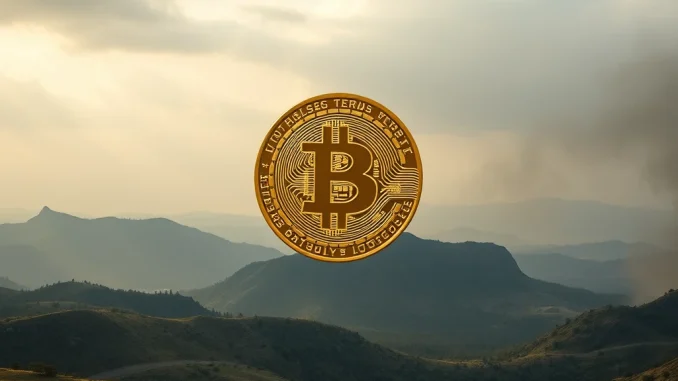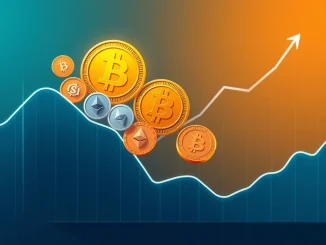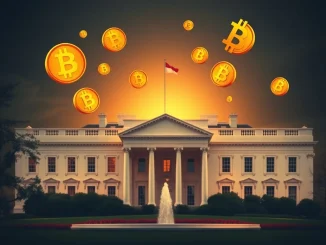
In a world often shaken by global events, the financial landscape constantly shifts. As tensions rise, particularly in the wake of escalating situations like the recent developments between Israel and Iran, traditional markets often react with volatility. But what about the Bitcoin? Could geopolitical conflict, paradoxically, strengthen its position in the long run? This question is gaining traction among analysts and participants in the crypto market.
Geopolitical Conflict and the Specter of Inflation
One of the primary arguments linking geopolitical conflict to a potentially favorable environment for Bitcoin centers on the concept of inflation. According to a Cointelegraph report citing Mithil Thakore, co-founder of Velar, prolonged conflicts can increase the likelihood of rising global inflation in the long term.
Why is this the case? Geopolitical tensions often lead to:
- Increased fiscal spending (e.g., defense, aid)
- Potential monetary easing to stimulate economies affected by uncertainty
- Disruptions to global supply chains
- Surges in raw material prices (like oil and commodities)
These factors collectively put upward pressure on prices, leading to inflation. And this is where Bitcoin proponents see an opportunity.
Bitcoin: An Inflation Hedge in Times of Uncertainty?
The narrative that Bitcoin can serve as an inflation hedge is not new. With its fixed supply cap of 21 million coins, Bitcoin is often compared to digital gold. In theory, unlike fiat currencies which can be printed in unlimited quantities (potentially leading to devaluation and inflation), Bitcoin‘s scarcity should, over time, help it retain value, or even increase in value, as purchasing power of fiat currencies declines due to inflation.
During periods where geopolitical conflict fuels inflationary expectations, investors may seek assets outside the traditional financial system or those perceived as stores of value. This is the core argument for Bitcoin‘s potential benefit in such environments.
Is Bitcoin a True Safe Haven Asset?
Beyond just being an inflation hedge, Bitcoin is sometimes discussed as a Bitcoin safe haven asset. A safe haven is typically an investment that is expected to retain or increase in value during times of market turbulence. Gold has historically filled this role.
The argument for Bitcoin as a Bitcoin safe haven rests on its decentralized nature, lack of correlation (at least theoretically) with traditional markets, and accessibility. In regions experiencing instability, accessing traditional banking or moving wealth can become difficult. Bitcoin, accessible with just an internet connection and a wallet, could potentially offer an alternative.
However, it’s crucial to note that Bitcoin‘s performance during past conflicts has been mixed. It often behaves like a risk asset, experiencing sell-offs alongside stocks during initial panic. The Bitcoin safe haven thesis is more of a long-term potential, dependent on increasing adoption and maturity of the crypto market.
Navigating the Crypto Market During Conflict
The Cointelegraph report highlighted several key variables that determine how Bitcoin reacts to conflict and how effectively it might function as an inflation hedge or Bitcoin safe haven. Understanding these factors is vital for anyone observing the crypto market:
- Level of Cryptocurrency Adoption: How many people globally actually use or hold Bitcoin? Higher adoption means a larger base of users potentially seeking it during uncertainty.
- Exposure and Correlation with Traditional Financial Markets: Is Bitcoin trading primarily influenced by stock market movements or does it increasingly move independently? Higher correlation weakens the safe haven argument.
- Geographical Accessibility: In areas directly affected by geopolitical conflict, how easy is it for individuals to buy, sell, or store Bitcoin? Infrastructure, regulations, and internet access play a role.
These variables are constantly evolving. As Bitcoin matures and becomes more integrated into the global financial consciousness, its reaction to external shocks like geopolitical conflict may change.
Challenges and Nuances
While the long-term potential for Bitcoin during inflationary periods driven by conflict is a compelling thesis, it’s not without challenges. The crypto market is still relatively small compared to traditional asset classes, making it susceptible to volatility. Regulatory uncertainty in various parts of the world also adds a layer of risk.
Furthermore, the immediate aftermath of a major geopolitical conflict can see a broad flight to liquidity, where investors sell assets across the board, including Bitcoin, to hold cash. The inflationary effects that might favor Bitcoin are typically longer-term consequences, not immediate reactions.
Actionable Insights
For those watching the crypto market, the analysis suggests:
- Don’t expect Bitcoin to automatically surge the moment geopolitical conflict erupts. Short-term volatility is likely.
- Consider the long-term inflation hedge narrative. If you believe conflict contributes to future inflation, Bitcoin might be a relevant asset to consider as part of a diversified portfolio.
- Pay attention to the evolving factors: global crypto adoption, regulatory clarity, and the correlation of Bitcoin with traditional markets.
Conclusion
While the short-term impact of geopolitical conflict on the crypto market can be unpredictable, the analysis suggesting a long-term benefit for Bitcoin holds weight, primarily through the channel of inflation. As global tensions persist, the potential for increased fiscal spending and monetary easing grows, fueling inflationary pressures that could make Bitcoin‘s fixed supply more appealing as an inflation hedge and potentially strengthen its case as a Bitcoin safe haven over time. However, realizing this potential depends on continued crypto adoption and a shift in its correlation with traditional assets. The relationship is complex, but the long-term narrative for Bitcoin amidst global uncertainty remains a compelling point of discussion.



